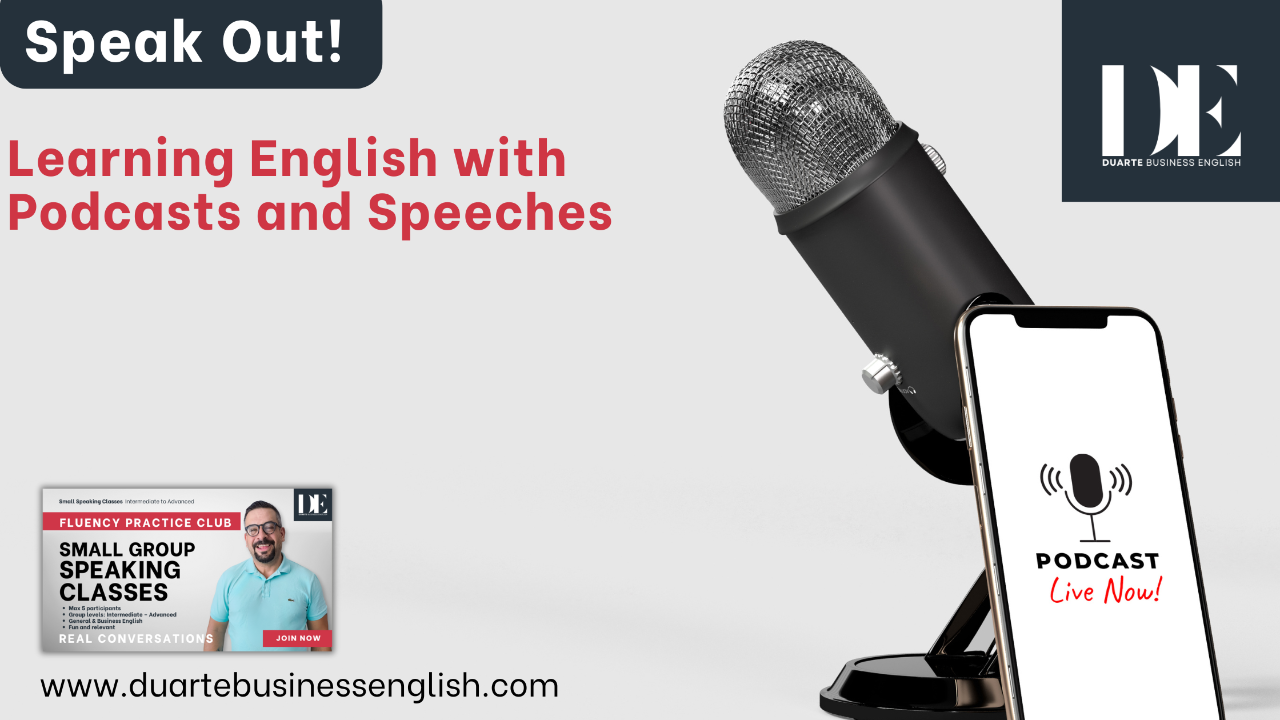Speak Out! Learning with Podcasts and Speeches
Jul 20, 2025
Using Authentic Audio like “The Great Speeches Challenge” for Listening Comprehension
Listening is one of the most powerful yet overlooked skills in English learning. While many learners focus on grammar and vocabulary, listening builds your understanding of real spoken English, natural pronunciation, and advanced vocabulary in context. One of the best ways to boost your listening skills is by using authentic audio—and that is where podcasts and speeches come in.
Why Podcasts and Speeches Are So Effective
Most textbooks provide scripted conversations that sound nothing like how people speak in real life. Podcasts and famous speeches, on the other hand, expose you to a variety of accents, speeds, emotions, and real language use. This helps you:
▪︎ Improve your comprehension in real situations
▪︎ Learn natural pronunciation and intonation
▪︎ Expand vocabulary with context
▪︎ Practice active listening, not just passive hearing
The Power of the Great Speeches Challenge
One excellent method for practicing with speeches is the Great Speeches Challenge. This involves choosing powerful English-language speeches from history and listening to one each week. You can start with speeches by Martin Luther King Jr, Steve Jobs, Barack Obama, or even famous TED Talks.
The goal is not to memorize the speech, but to study how the speaker delivers their message. Focus on:
▪︎ Word stress and sentence rhythm
▪︎ Rhetorical devices like repetition and contrast
▪︎ Emotional tone and pauses
▪︎ How key vocabulary is used in context
You can find these speeches on YouTube, podcast platforms, or public archives.
How to Practice with Podcasts
Podcasts are another excellent tool. They are free, easy to access, and cover every topic imaginable. To use podcasts for English improvement:
-
Choose the right level – Find a podcast that challenges you but is not too difficult.
-
Listen with a transcript – Many podcasts offer transcripts so you can follow along and check unfamiliar words.
-
Repeat short sections – Replay parts that are hard to understand and shadow the speaker to improve pronunciation.
-
Take notes – Write down new vocabulary, phrases, and expressions.
-
Use your voice – Practice repeating what you hear to train your ear and speaking muscles at the same time.
Some great podcast recommendations for English learners include:
▪︎ “The English We Speak” by BBC Learning English
▪︎ “All Ears English”
▪︎ “Thinking in English”
▪︎ “Speak Better English with Harry”
▪︎ “ESLPod”
Real Tips to Maximize Your Listening Practice
▪︎ Make listening a daily habit – 10 to 15 minutes a day is enough to build real progress
▪︎ Listen while walking, commuting, or cooking
▪︎ Combine listening with speaking – repeat after the speaker
▪︎ Do not worry about understanding every word
▪︎ Focus on the overall message and tone
Final Thoughts
If you want to become a fluent and confident English speaker, you must train your ears to understand real English. Authentic audio like podcasts and famous speeches offers a rich, natural learning experience that goes far beyond traditional lessons. You will build comprehension, vocabulary, and confidence—all while enjoying content that inspires and informs.
Start your Great Speeches Challenge today. Choose one speech. Listen actively. Speak boldly. That is how you reach your English success.
Learn about our collection of English courses.
Stay connected with news and updates!
Join our mailing list to receive the latest news and updates from our team.
Don't worry, your information will not be shared.
We hate SPAM. We will never sell your information, for any reason.





